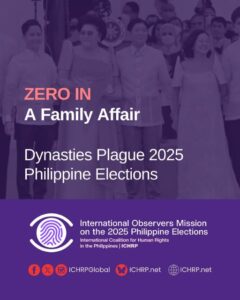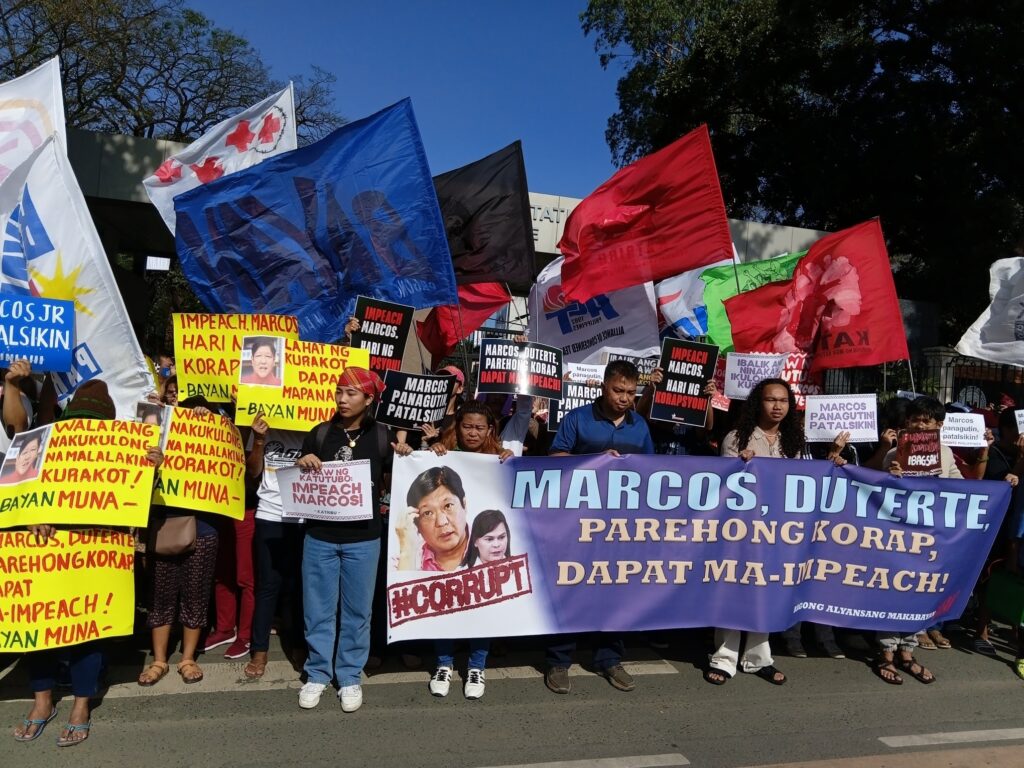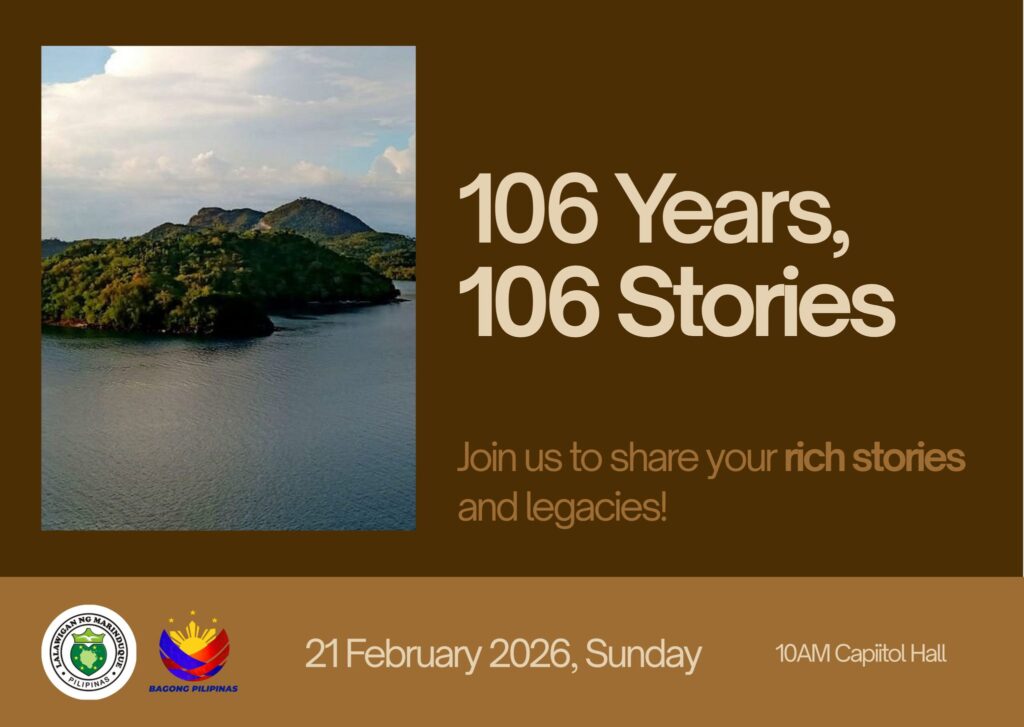Three of the Philippines’ richest men are bankrolling the country’s largest political parties, further entrenching an oligarchic stronghold over the 2025 national elections that is expected to maintain, not disrupt, the country’s feudal political order.
Data from the International Coalition for Human Rights in the Philippines (ICHRP) showed that real estate tycoon Manny Villar, infrastructure and casino magnate Enrique Razon, and conglomerate boss Ramon Ang — three of the 10 wealthiest Filipinos — are the principal backers of the Nacionalista Party, National Unity Party (NUP), and Nationalist People’s Coalition (NPC), respectively.
“The 2025 Philippine elections are dominated by political dynasties — an oligarchy of elite families rooted in the feudal land and political structures that pervade Philippine society,” said ICHRP, which documents the extent of dynastic influence.
The business moguls’ grip on politics is reinforced by the Marcos-Romualdez clan, which holds the presidency, a Senate seat, and multiple congressional and provincial positions.
ICHRP noted that at least five Marcoses are running for seats in the Senate, House, and the local government in Ilocos Norte this year. The human rights group, citing the count of the Philippine Centre for Investigative Journalism (PCIJ), also showed that at least five Romualdezes are also running for various positions in Leyte.
Despite the 1987 Constitution’s ban on political dynasties, ICHRP said its enforcement has remained weak — largely because the dynasts themselves dominate Congress.
The May 2025 elections underscore the extent of that control: 71 of 82 provincial governments are under dynastic rule, with 47 governors seeking re-election and another 19 fielding relatives as successors. In the House of Representatives, 142 incumbent district lawmakers running again belong to political clans.
“The domination of specific families at the local, provincial and national level resembles a caste system, where only the feudal ‘princes and princesses’ born into privilege can find a door to enter the political system,” ICHRP said.
Villar, Razon, Ang: Billionaires turned kingmakers
The Villar family alone offers a case study in the convergence of wealth and power. Senator Cynthia Villar, term-limited in the Senate, is running for her former post as Las Piñas congresswoman — a seat currently held by her daughter Camille, who in turn is running for the Senate.
“To bypass legislative restrictions on terms in office, members of the same clan often substitute a relative or advance to a higher position. At least 67 outgoing district representatives have opted to switch positions with family members, ensuring their political influence remains intact,” ICHRP wrote.
Other dynastic tandems in the Senate include siblings Alan Peter and Pia Cayetano, and half-brothers Jinggoy Estrada and JV Ejercito. “Both brothers of Senator Raffy Tulfo are running to join him in the Senate in 2025 so it could result in 4 family sets that when combined would control almost 40% of the Senate seats.”
Meanwhile, Ramon Ang, president of San Miguel Corp., has quietly built influence through the NPC — long considered a catch-all party for provincial kingpins — while Enrique Razon’s NUP has become the favored vehicle for business-aligned candidates.
The party-list system, intended as a democratic avenue for marginalized sectors, is also heavily compromised.
Research by the PCIJ showed that 36 of the 54 party-list groups (66%) in the current 19th Congress have at least one nominee belonging to a political family.
The system has become “a backdoor to the House for political dynasties and big businesses,” the report noted. In the May 2025 elections, at least 78 out of the 156 party-list organizations certified by the Commission on Elections (Comelec) belong to political families.
Speaker Martin Romualdez, for instance, is fielding his son Andrew to take over the Tingog party-list, replacing his wife Yedda.
A system only the rich can enter
Campaigning is prohibitively expensive for ordinary Filipinos. Data frim IBON Foundation showed that the average spending per candidate for the elective positions in 2022 are as follows: President (P3 billion), Vice President (P1 billion), Senator (P350 million), Congress (P15 million)… Mayor (P3 million),” compared to an “average across-the-country minimum wage of P470.”
“It is almost impossible to compete for political office without significant wealth, limiting successful candidates to those born in families of economic and political elites. This is true even in the local elections,” the report said.
From inequality to impunity
The result is a political landscape marked by entrenched power and deep poverty. “Political dynasties are inherent in a society marked by high inequality and poverty, which stem from the historical concentration of land and wealth ownership in the hands of a few.”
By 2025, “approximately 80% of provincial governors belong to ‘fat dynasties’,” a figure that has surged from 57% in 2004. House representation by dynasties has risen to 67%, and mayoral dynasties now control 53% of localities.
A 2015 study by the Philippine Institute for Development Studies (PIDS) found that “dynasties are pervasive in the 10 poorest provinces that are afflicted by low levels of human development, bad governance, violence, and poor business climates.”
In short, elections have become a theater of succession, not change.
“The historic feudal and social and economic system have created a trajectory whereby the political system becomes less and less democratic with each electoral cycle,” the report concluded. (TCSP)





Nice post. I be taught one thing more challenging on totally different blogs everyday. It’s going to at all times be stimulating to learn content material from other writers and follow a bit something from their store. I’d prefer to make use of some with the content on my weblog whether you don’t mind. Natually I’ll provide you with a hyperlink in your web blog. Thanks for sharing.
compte melbet telecharger melbet apk
connexion au site web 1win 1win apk
Производим пластиковые https://zavod-dimax.ru окна и выполняем профессиональную установку. Качественные материалы, точные размеры, быстрый монтаж и гарантийное обслуживание для комфорта и уюта в помещении.
Жалюзи от производителя https://balkon-pavilion.ru изготовление, продажа и профессиональная установка. Большой выбор дизайнов, точные размеры, надёжная фурнитура и комфортный сервис для квартир и офисов.
Изделия из пластмасс https://ftk-plastik.ru собственного производства. Продажа оптом и в розницу, широкий ассортимент, надёжные материалы и стабильные сроки. Выполняем заказы любой сложности по техническому заданию клиента.
Производство оборудования https://repaircom.ru с предварительной разработкой и адаптацией под требования клиента. Качественные материалы, точные расчёты, соблюдение сроков и техническая поддержка.
Торговая мебель https://woodmarket-for-business.ru от производителя для бизнеса. Витрины, стеллажи, островные конструкции и кассовые модули. Индивидуальный подход, надёжные материалы и практичные решения для продаж.
Szukasz kasyna? kasyno pl w Polsce: wybor najlepszych stron do gry. Licencjonowane platformy, popularne sloty i kasyna na zywo, wygodne metody platnosci, uczciwe warunki i aktualne oferty.
Grasz w kasynie? Kasyno internetowe w Polsce to najlepsze miejsca do gry w latach 2025–2026. Zaufane strony, sloty i gry na zywo, przejrzyste warunki, wygodne wplaty i wyplaty.
Ищешь блины для штанки? https://blin-na-shtangy.ru для эффективных силовых тренировок. Чугунные и резиновые диски, разные веса, долговечность и удобство использования. Решение для новичков и опытных спортсменов.
Нужен проектор? http://projector24.ru большой выбор моделей для дома, офиса и бизнеса. Проекторы для кино, презентаций и обучения, официальная гарантия, консультации специалистов, гарантия качества и удобные условия покупки.
Do you need a master? Local Philly handyman for apartments and houses. Repairs, installation, replacement, and maintenance. Experienced specialists, professional tools, and a personalized approach to every task.
Проблемы с авто? ремонт электрики шкода спб диагностика, ремонт электрооборудования, блоков управления, освещения и систем запуска. Опыт, современное оборудование и точное определение неисправностей.
Celebrity World Care https://celebrityworldcare.com интернет-магазин профессиональной медицинской и натуральной косметики для ухода за кожей при ихтиозе, дерматитах, псориазе и других дерматологических состояниях. Сертифицированные средства с мочевиной, без отдушек и парабенов. Доставка по России.
квартира в сочи жк светский лес сочи
Модульные дома https://modulndom.ru под ключ: быстрый монтаж, продуманные планировки и высокое качество сборки. Подходят для круглогодичного проживания, отличаются энергоэффективностью, надежностью и возможностью расширения.
Сколько стоит водительская медсправка https://med-spravki-msk.ru
экран для проектора интернет-магазин проекторов